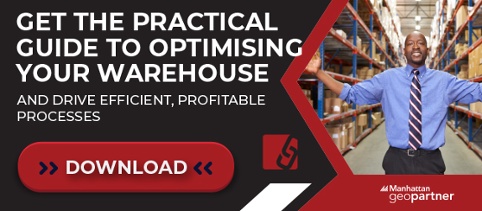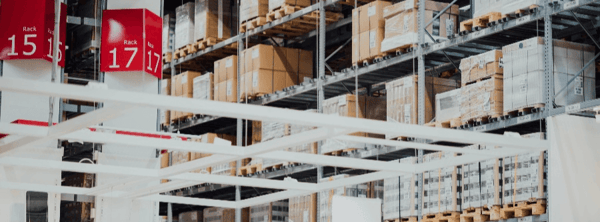Guide: Buying Vs. Building A Warehouse Management System
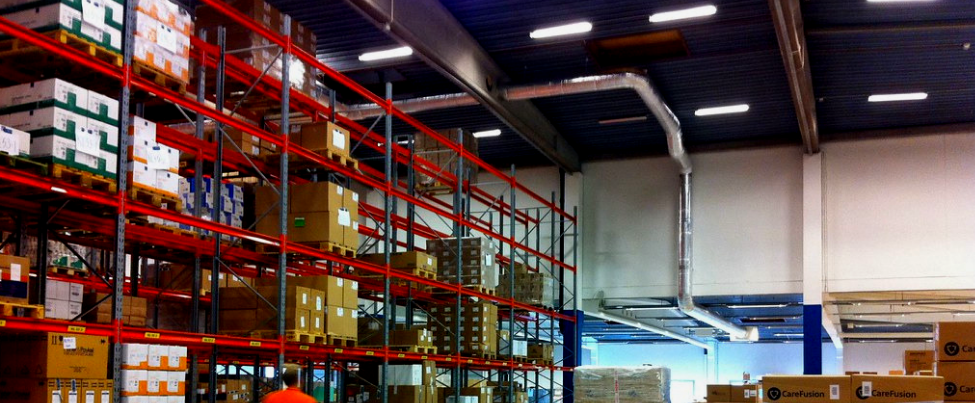
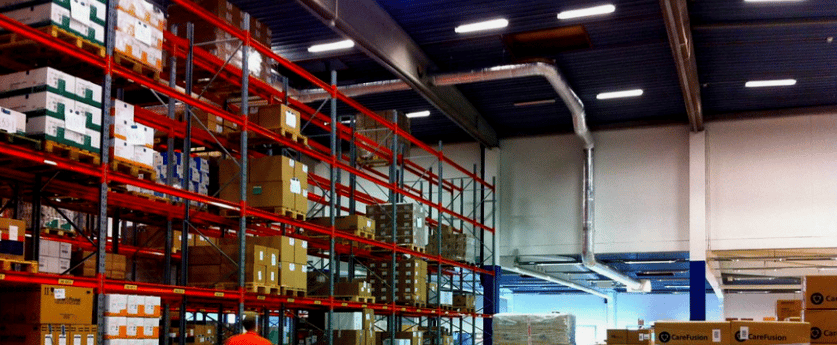
Each warehouse is different, presenting its own set of challenges, limitations, and advantages, with solutions that must be tailored to a specific industry. With this in mind, it’s important to take your specific business requirements into consideration when you decide how to build or buy your WMS.
The successful implementation of a WMS is the result of a detailed understanding of your business requirements, your processes, and the challenges you face in your day-to-day operations. With extensive market growth in the Middle East and Africa, it’s time to start considering your WMS options.
Build or Buy a WMS: What are your options?
Packaged Warehouse Management software is on an upward trajectory, becoming more integrated, flexible, and functional in all industries. However, you may feel that you require a custom build to fully accommodate your business requirement. Here are the options you have available:
1. Buy a comprehensive WMS package
With multiple WMS options available, you can pick and choose a package that satisfies your requirements. This gives you a ready-made solution with possible customisation options and integrations that you can work into your business. It is possible to buy a WMS that is fully customisable and can be implemented in line with your business specifications, that provides you with the highest level of innovation and future-readiness and helps you to match industry best-practices.
See what a comprehensive package can provide you with
2. Build your own WMS
Should you have specific business requirements that merit a custom build, it is feasible to hire a team to build your solution, specify the features, manage the integrations, and implement it with your own team. This may prove to be the simplest, most practical solution in certain businesses. The onus is on you, then, to ensure your WMS is future-flexible, and to manage the key updates, reconfiguration, customization, and new integrations.
Our rule of thumb: Large businesses have more complex processes to manage, and as such, the custom-build of a WMS could take years. Smaller businesses with simpler processes have a higher chance of completing the build and implementation in a more rational time frame.
However, the decision is a bit more complex than it seems, and each solution has its own list of benefits. We recommend assessing your business based on your analysed processes and capabilities and making a choice that gives you the greatest value.
The business and warehouse criteria that steer your “build or buy” decision:
Business size
The larger your business, the more budget you likely have to spend on a Warehouse Management System that optimises your processes to match demand. However, the size of your business may also dictate that you have less time available to spend on a custom build, with much more demand for innovation, flexibility, and future-readiness. On the other side, in small businesses, a custom-built solution can bring the simplicity you need without over-delivering on functionality and capabilities.
Business type
The type of business you run can dictate how you approach your decision to build or buy.
- How many processes, integrations, movements, and steps must be included?
- If your business has complex processes and large amounts of data that need to be included, it may impact the time it takes to build your WMS.
Consider whether your business already has the technical savvy and sufficient industry domain expertise to build and maintain your own WMS, if you have the resources to run and upgrade it intermittently, and if the build of your WMS will develop your operational capabilities in line with a business goal.
If your business-type does not give you the capability to build your own solution and your business goals don’t align with a need to technically upskill, a packaged WMS can save you immense amounts of time, effort, and money in the long-run.
Business goals
Mentioned above and expanded here:
- Does your business absolutely need a custom-built, competitive in-house solution to take on best-in-class competitors?
- Will you be training up staff to manage your WMS in line with an existing growth strategy?
- Do you want to have a business that is self-contained and requires innovation from internal teams?
Consider where you’d like to be in the future. Buying a package may facilitate a simpler growth path in certain businesses, where building one may align with a goal to self-contain and grow technical capabilities. If you’d like to compare yourself to your competitors, have a look at our benchmarking checklist for tips.
Projected growth
All businesses aim for growth, but your expansion may require a different set of enabling factors to ensure you stay on track.
If your aim is to follow a growth boom with a WMS that can flexibly and reliably match your consumer demand, think hard about how you can ensure that the background management is taken care of while you grow.
Can you guarantee that your internal team is competent, innovative, and on-the-ball enough to provide the support you need in your warehouse? Or will you benefit more from a vendor’s input and support?
Time available
How long will your implementation take if you build vs buy?
If you’re implementing a WMS in a hurry, the size and type of your business will absolutely influence which option you choose:
Building a WMS in a large, complex, process-heavy warehouse and supply chain will not be a quick, simple process.
Building a WMS in a smaller, simpler business will take less time, be a less intensive process, and require less labour.
Consider the time you have available, what is possible in your required time frame, and make your plans accordingly.
Budget
While a build can seem like the answer, you need to establish the costs based on all variables, as discussed in our blog “How much does a warehouse management system cost?”.
A build and implementation may have vastly different costs to a packaged implementation and knowing exactly what costs you are dealing with will help your decision along.
The best-in-class WMS processes that impact your build/buy decision
The factors discussed above are not the only factors that influence your decision. With software builds becoming easier and more accessible, and large IT departments upskilling to provide the support services, you may find that your landscape allows you a solid, effective build.
Our table below gives you the comparison between the best-in-class processes that impact whether you should go forward with your WMS build, or opt for a WMS package.
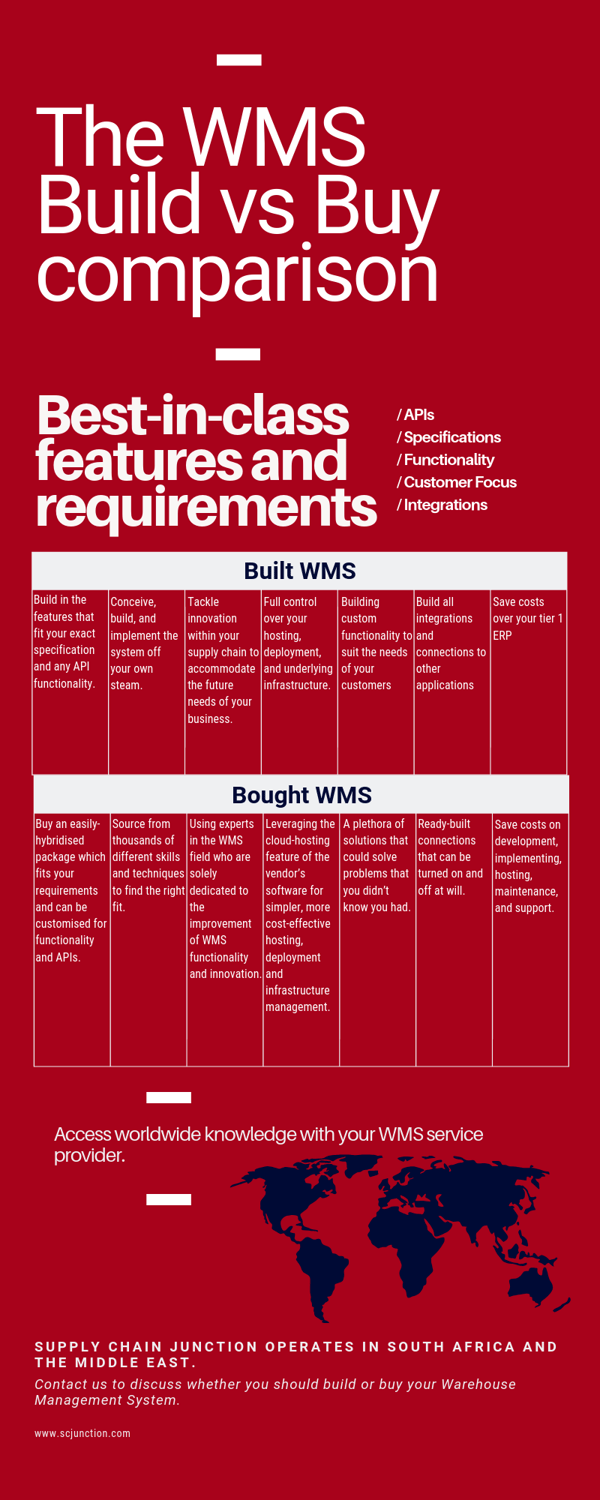
Understanding your business is the first step to knowing which route to take. Following this, a good estimate of what will be involved and how long it may take is critical.
TAGS
- WMS (51)
- Warehouse Best Practice (46)
- Implementing a WMS (29)
- Managing your warehouse (19)
- Omni Channel (18)
- eCommerce (18)
- Blog (16)
- Supply Chain Best Practice (16)
- Mid-Level (8)
- Customer Journey (7)
- Warehouse optimisation (7)
- General Tips (5)
- Industry General (5)
- Information (5)
- Trends (5)
- managing your Supply Chain (5)
- saudi arabia (5)
- smart warehouse (4)
- 3PL (3)
- News (3)
- ERP (2)
- Entry-level (2)
- ROI (2)
- Case Study (1)
- OMS (1)
- Picking (1)
- Press Release (1)
- Solution-Specific (1)
- Transport Management System (1)
Take A Look At The Results Of A Successful WMS Implementation.
See how Tarsus Distribution, in collaboration with SCJ boost overall efficiency by 60%

